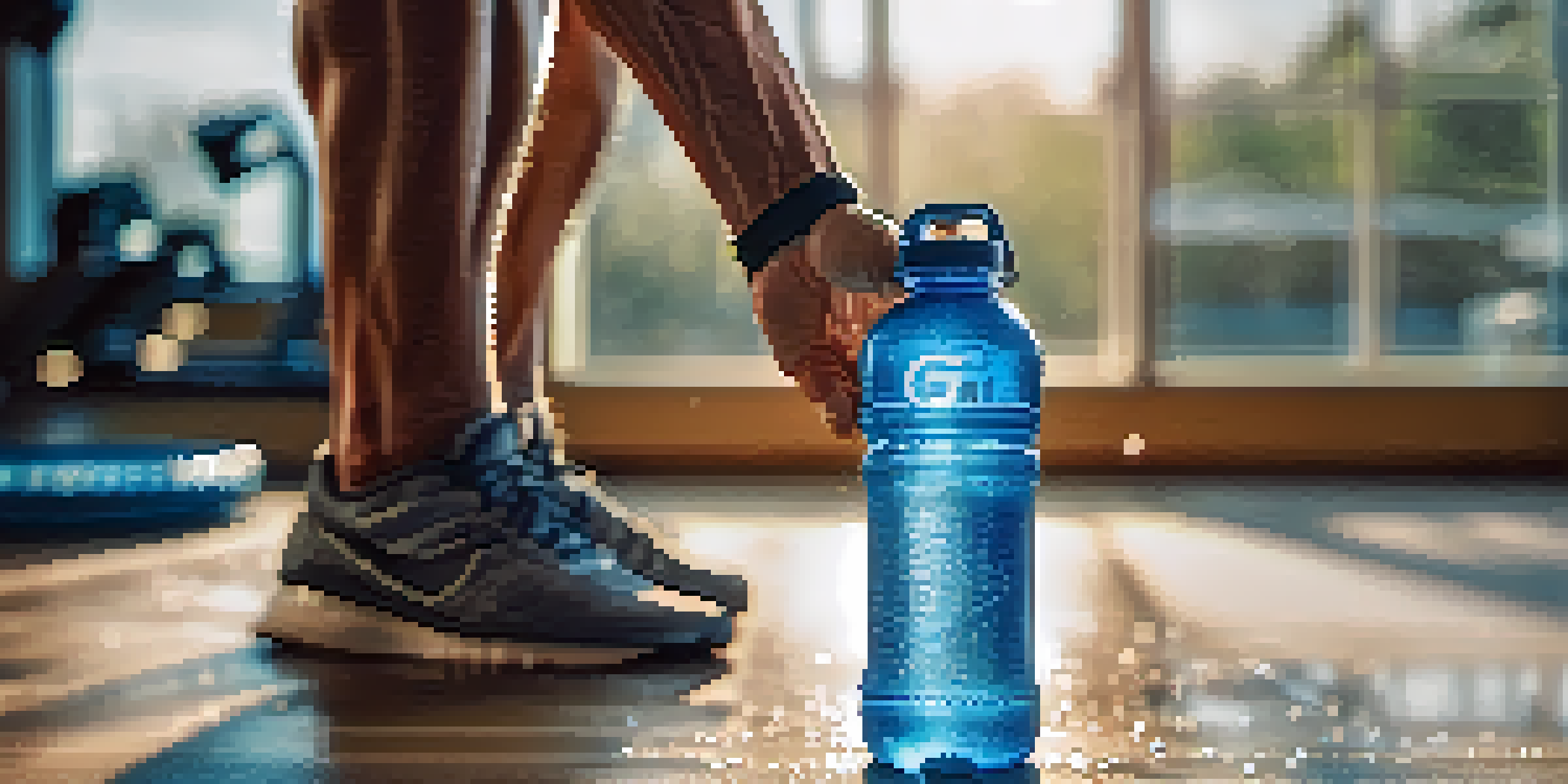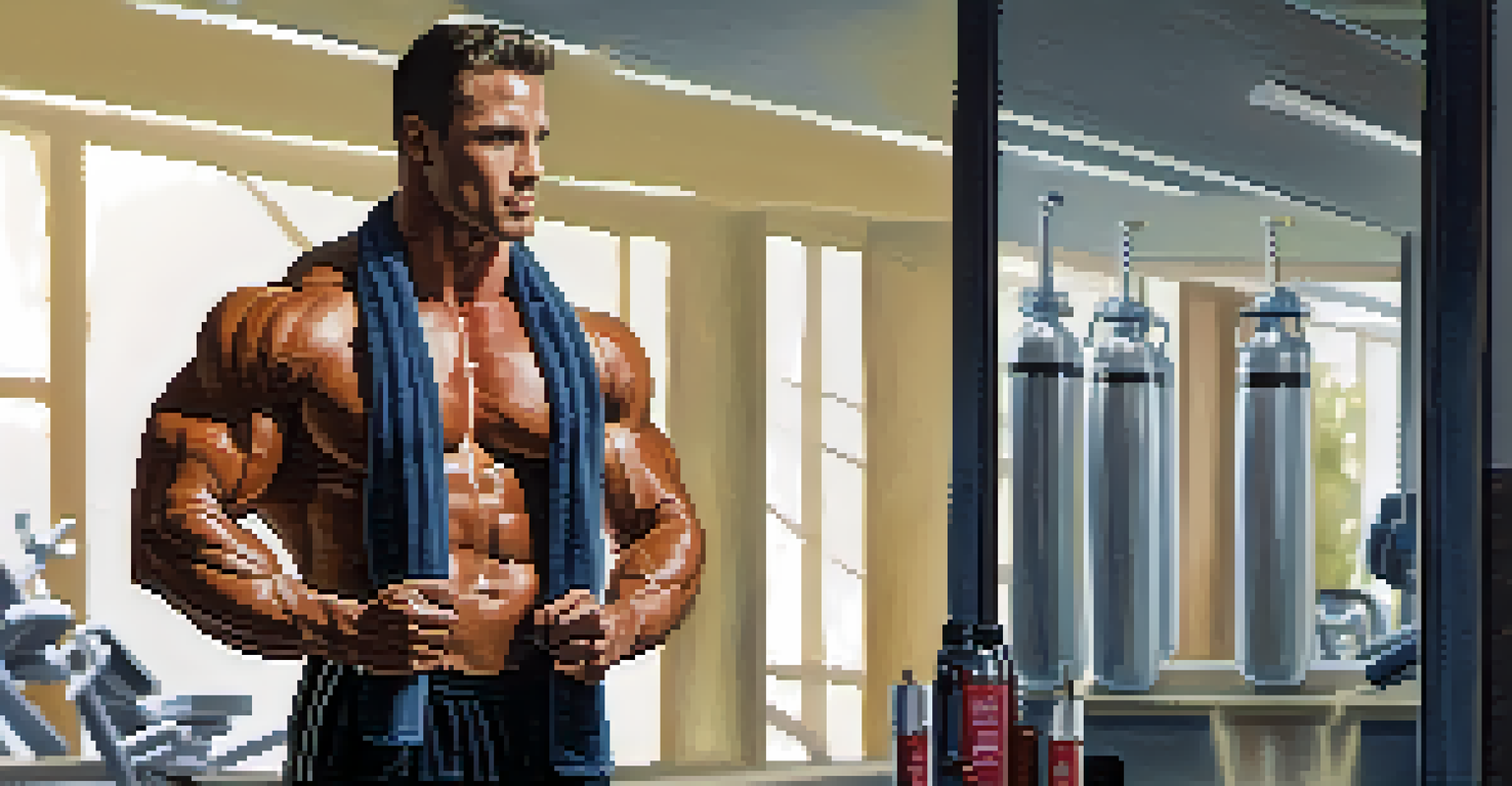Hydration Strategies for Optimal Performance in Bodybuilders

Understanding the Importance of Hydration for Bodybuilders
Hydration is often overlooked, yet it plays a crucial role in a bodybuilder's performance. Water supports vital functions, including nutrient transport and temperature regulation, which are essential during intense workouts. Without adequate hydration, muscle fatigue can set in faster, impeding progress and leading to potential injuries.
Water is the source of life, and it is essential for our bodies to function at their best.
Moreover, dehydration can negatively affect strength and endurance levels. Even a small drop in body water percentage can decrease performance by 10-20%. Therefore, understanding hydration's significance is the first step towards optimizing your bodybuilding results.
The goal isn’t just to drink water but to maintain a balance that supports your training and recovery. Incorporating hydration strategies into your routine can make a noticeable difference, ensuring you stay on track with your fitness goals.
Daily Water Intake: How Much Do You Need?
Determining the right amount of water to drink daily can be a bit tricky, as it varies based on several factors such as body weight, activity level, and climate. A common guideline is to drink at least half your body weight in ounces. For example, if you weigh 180 pounds, aim for about 90 ounces of water daily.

It's important to listen to your body; thirst is a natural indicator that you need hydration. However, you shouldn’t rely solely on thirst, especially during intense training sessions, where you may not feel thirsty until it's too late. Keeping a water bottle handy can help remind you to sip consistently throughout the day.
Hydration Boosts Performance
Adequate hydration is essential for optimal strength, endurance, and recovery in bodybuilding.
In addition to water, consider factors like your diet and the weather. Consuming foods with high water content, like fruits and vegetables, can also contribute to your daily hydration needs.
Pre-Workout Hydration: Setting the Stage for Success
Proper hydration before a workout can significantly enhance your performance. Aim to drink at least 16-20 ounces of water 2-3 hours before exercising, allowing your body to absorb the fluid. This pre-workout hydration helps prevent fatigue and keeps your muscles functioning optimally.
Hydration is key to optimal performance in any physical activity. Without it, you're just not going to perform at your peak.
Incorporating electrolyte-rich beverages, such as sports drinks, can also be beneficial, especially if you’re engaging in prolonged workouts. Electrolytes help maintain fluid balance and muscle function, which is crucial for high-intensity training.
Remember, your body needs time to process the fluids, so avoid chugging large amounts of water right before you hit the gym. Instead, make it part of your warm-up routine to ensure you’re hydrated and ready to perform your best.
Hydration During Workouts: Staying Refreshed
While training, it’s essential to continuously hydrate to maintain performance levels. Depending on the duration and intensity of your workout, aim to drink 7-10 ounces of water every 10-20 minutes. This can help prevent dehydration and keep your energy levels up.
For workouts lasting over an hour, consider including electrolyte drinks to replenish lost minerals. The combination of water and electrolytes can help sustain endurance, especially during high-intensity sessions.
Daily Water Intake Guidelines
Aim to drink at least half your body weight in ounces daily to maintain proper hydration levels.
Keep an eye on your body’s signals. If you start feeling fatigued or dizzy, it might be a sign to hydrate more. Staying proactive about hydration can help you push through those challenging sets.
Post-Workout Recovery: Replenishing Lost Fluids
After an intense workout, your body needs to recover, and hydration plays a pivotal role in that process. Aim to drink at least 16-24 ounces of water within the first hour after exercising. This helps replenish the fluids lost through sweat and supports muscle recovery.
Including protein shakes mixed with water can also be advantageous, as they not only hydrate but provide essential nutrients for muscle repair. The combination of protein and hydration can enhance your recovery and prepare you for your next workout.
Additionally, don’t forget to monitor your urine color as an indicator of hydration status. Light yellow urine typically signals good hydration, while darker urine can indicate a need for more fluids.
Signs of Dehydration: Recognizing When to Act
Being aware of the signs of dehydration is crucial for bodybuilders. Common symptoms include excessive thirst, dry mouth, fatigue, dizziness, and dark-colored urine. If you experience any of these symptoms, it’s essential to rehydrate quickly to avoid adverse effects on your performance.
More severe symptoms can include confusion or a rapid heartbeat, which require immediate attention. Understanding your body’s cues will help you take action before dehydration affects your workouts.
Recognize Dehydration Symptoms
Being aware of dehydration signs, such as fatigue and dark urine, can help you take action to stay hydrated.
Keeping a hydration log can be an effective strategy to track your intake and notice patterns in your hydration habits. This proactive approach can help you stay ahead of any dehydration issues.
Hydration Myths: Separating Fact from Fiction
There are several myths surrounding hydration that can lead to confusion. One common misconception is that you can only hydrate with water. In reality, many beverages, including herbal teas and even coffee, can contribute to your daily fluid intake.
Another myth is that you should wait until you’re thirsty to drink. By the time you feel thirsty, you may already be dehydrated. It’s better to sip consistently throughout the day rather than relying on thirst alone.

Lastly, some believe that all hydration needs are equal, which isn’t true. Your hydration needs will vary based on factors like your workout intensity, body size, and environmental conditions. Understanding these nuances can help you develop more effective hydration strategies.
Conclusion: Making Hydration a Priority
In conclusion, hydration is a vital component of optimal performance for bodybuilders. By understanding your hydration needs and implementing effective strategies, you can enhance both your training and recovery processes. Remember, staying hydrated is not just about drinking water; it’s about creating a holistic approach that supports your fitness journey.
Make hydration a priority in your routine—track your intake, listen to your body's signals, and incorporate electrolyte-rich beverages when necessary. This commitment can lead to improved performance and overall health.
As you continue your bodybuilding journey, keep these hydration strategies in mind to ensure you’re performing at your best. Hydration is a simple yet powerful tool that can help you reach your goals.